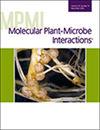Pablo A Gutierrez, Joshua Fuller, Sydney Stroschein, Austin VanDenTop, Dennis Halterman, Aurélie M Rakotondrafara
求助PDF
{"title":"Potato Virus Y Restricts <i>Alternaria solani</i> Growth During Co-Infection.","authors":"Pablo A Gutierrez, Joshua Fuller, Sydney Stroschein, Austin VanDenTop, Dennis Halterman, Aurélie M Rakotondrafara","doi":"10.1094/MPMI-03-25-0026-R","DOIUrl":null,"url":null,"abstract":"<p><p>In the environment, multiple microbes can interact with each other in the plant phyllosphere. These associations can shape the plant's development, stress responses, and disease susceptibility, but the molecular mechanisms that govern this process remain unexplained. Of interest are the multiple or successive infections that crop plants are exposed to within a growing season. One of the most common and economically important viruses of potato is potato virus Y (PVY, <i>Potyviridae</i>). We show that PVY infection of potato limited the expansion of foliar necrotic lesions caused by the early blight fungus <i>Alternaria solani</i>. The reduced growth phenotype persisted when the fungal mycelium was transferred to solid growth media. RNA-seq analysis of responses in potato and <i>A. solani</i> to the presence of PVY suggested two mechanisms that can explain this interaction. First, in <i>A. solani</i> exposed to PVY-positive leaves, we observed a downregulation of fungal pathogenicity genes. Second, we found that, in the absence of PVY, <i>A. solani</i> downregulates ethylene-responsive defense in potato, but this effect was eliminated when the host was infected with PVY. Our findings expand our understanding of how pathogen virulence can be affected by other pathogens competing for the same host resources. The observation that PVY can alter <i>A. solani</i> infection illustrates the ecological role of viruses as a potential contributor to the development of disease outbreaks. [Formula: see text] Copyright © 2025 The Author(s). This is an open access article distributed under the CC BY-NC-ND 4.0 International license.</p>","PeriodicalId":19009,"journal":{"name":"Molecular Plant-microbe Interactions","volume":" ","pages":"543-556"},"PeriodicalIF":3.4000,"publicationDate":"2025-07-01","publicationTypes":"Journal Article","fieldsOfStudy":null,"isOpenAccess":false,"openAccessPdf":"","citationCount":"0","resultStr":null,"platform":"Semanticscholar","paperid":null,"PeriodicalName":"Molecular Plant-microbe Interactions","FirstCategoryId":"99","ListUrlMain":"https://doi.org/10.1094/MPMI-03-25-0026-R","RegionNum":3,"RegionCategory":"生物学","ArticlePicture":[],"TitleCN":null,"AbstractTextCN":null,"PMCID":null,"EPubDate":"2025/7/31 0:00:00","PubModel":"Epub","JCR":"Q2","JCRName":"BIOCHEMISTRY & MOLECULAR BIOLOGY","Score":null,"Total":0}
引用次数: 0
引用
批量引用
Abstract
In the environment, multiple microbes can interact with each other in the plant phyllosphere. These associations can shape the plant's development, stress responses, and disease susceptibility, but the molecular mechanisms that govern this process remain unexplained. Of interest are the multiple or successive infections that crop plants are exposed to within a growing season. One of the most common and economically important viruses of potato is potato virus Y (PVY, Potyviridae ). We show that PVY infection of potato limited the expansion of foliar necrotic lesions caused by the early blight fungus Alternaria solani . The reduced growth phenotype persisted when the fungal mycelium was transferred to solid growth media. RNA-seq analysis of responses in potato and A. solani to the presence of PVY suggested two mechanisms that can explain this interaction. First, in A. solani exposed to PVY-positive leaves, we observed a downregulation of fungal pathogenicity genes. Second, we found that, in the absence of PVY, A. solani downregulates ethylene-responsive defense in potato, but this effect was eliminated when the host was infected with PVY. Our findings expand our understanding of how pathogen virulence can be affected by other pathogens competing for the same host resources. The observation that PVY can alter A. solani infection illustrates the ecological role of viruses as a potential contributor to the development of disease outbreaks. [Formula: see text] Copyright © 2025 The Author(s). This is an open access article distributed under the CC BY-NC-ND 4.0 International license.
马铃薯Y病毒在共侵染过程中抑制茄交菌生长。
在环境中,多种微生物可以在植物层圈中相互作用。这些关联可以影响植物的发育、胁迫反应和疾病易感性,但控制这一过程的分子机制仍未得到解释。我们感兴趣的是农作物在一个生长季节所遭受的多重或连续的感染。马铃薯病毒Y (PVY, potyvirridae)是马铃薯最常见和最重要的经济病毒之一。结果表明,马铃薯PVY侵染限制了早疫病菌番茄赤霉引起的叶片坏死病变的扩大。当真菌菌丝体转移到固体培养基上时,这种减少的生长表型持续存在。马铃薯和茄属植物对PVY的反应的RNAseq分析提出了两种可以解释这种相互作用的机制。首先,在暴露于pvy阳性叶片的茄属植物中,我们观察到真菌致病基因的下调。第二,我们发现,在PVY缺失的情况下,茄蚜下调马铃薯的乙烯反应防御,但当宿主感染PVY后,这种作用被消除。我们的发现扩大了我们对病原体毒力如何受到竞争相同宿主资源的其他病原体的影响的理解。PVY可以改变茄蚜感染的观察结果说明了病毒作为疾病暴发发展的潜在贡献者的生态作用。
本文章由计算机程序翻译,如有差异,请以英文原文为准。

 求助内容:
求助内容: 应助结果提醒方式:
应助结果提醒方式:


